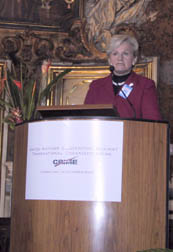Europe:
Italian
Ministers
Announce
Drug
Law
Revisions
6/30/06
Ministers from the freshly elected government of Premier Romano Prodi said Monday they would move quickly to reform a harsh drug law passed in the waning days of the previous Silvio Berlusconi administration. Known as the Fini-Giovanardi law after the neo-fascist politician who sponsored it and the Berlusconi minister who pushed it, that law erased the distinction between hard and soft drugs and set personal drug use quantity limits so low as to render many drug users subject to prosecution as drug sellers.
Health Minister Livia Turco isn't waiting for legislative action, she told the conference. Turco said that while Ferrero's bill worked its way through parliament, she was acting immediately to take administrative measures to ease enforcement of the law. One such measure would be to raise the amount of marijuana a person can possess, she said. Under the Fini-Giovanardi law, people holding more than about five grams of marijuana can be charged as drug dealers. (The law actually specifies ½ gram of the active drug, THC; with pot at 10% THC content, it would take about 5 grams to come up with a ½ gram of THC.) Turco also proposed a renewed emphasis on prevention, drawing the support of Minister for Youth Policies and Sports Giovanna Melandri. "The minister for youth policies is ready to play an active part in the work of drawing up such a plan", stated Melandri. "I am convinced that it is necessary to oppose the repressive culture of the Italian right, of which the Fini-Giovanardi law is a sign, with a culture of prevention and a strategy of social welcoming for the person and the families who live through the drama of drugs. It is the intention of this government to put an end to the era of demagogic proclamations and to start an era of serious policies in the struggle against drugs," she said in a statement quoted by the Italian news agency AGI. "From this point of view, I share the intention of Livia Turco to raise the maximum quantity of cannabis detainable without incurring the presumption of dealing, decriminalizing the consumption -- also for therapeutic purposes. Turco is moving in full harmony with the Union manifesto, agreed by all the parties in the current majority. The full commitment of the state needs to be directed towards the fighting and repressing traffic in drugs and towards the breaking up of criminal interests connected to this." Both Ferrero and Turco have already raised the hackles of the rightist parliamentarians responsible for the current law. Earlier this month, Ferrero suggested Italy might follow the example of several of its European neighbors and introduce safe injection sites for hard drug users, and Ferrero caused a stir of outrage by suggesting that many professional people, including politicians, had used cocaine. Ferrero was "pandering" to far-leftists who want to legalize drugs, rightist deputy Alfredo Mantovano of the National Alliance (AN) told ANSA. "Ferrero sees free pot and shooting-up as the one alternative to the centre right's reform," he claimed. AN's Daniela Santanche struck out at Health Minister Turco, saying her decision to ease enforcement of the Berlusconi drug law pending the passage of legislation was "extremely serious" and "it sends a terrible message to young people." But those are the people who lost the election. They don't have the votes to stop this, unless moderates in the governing coalition crumble.
|

